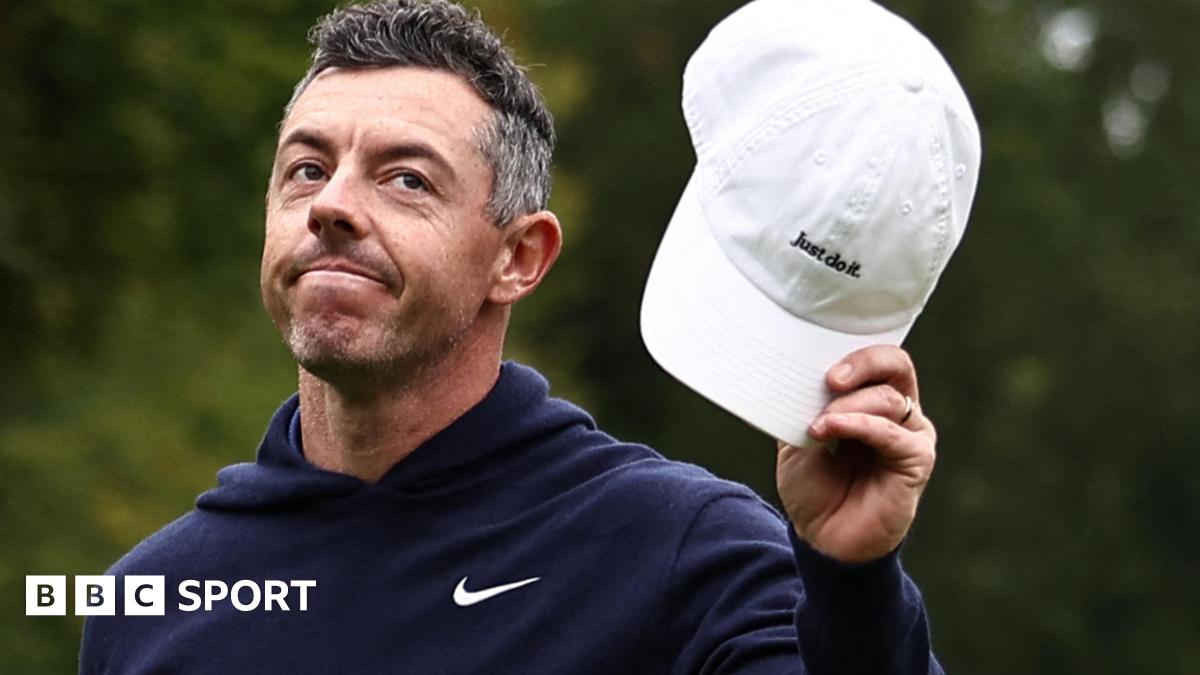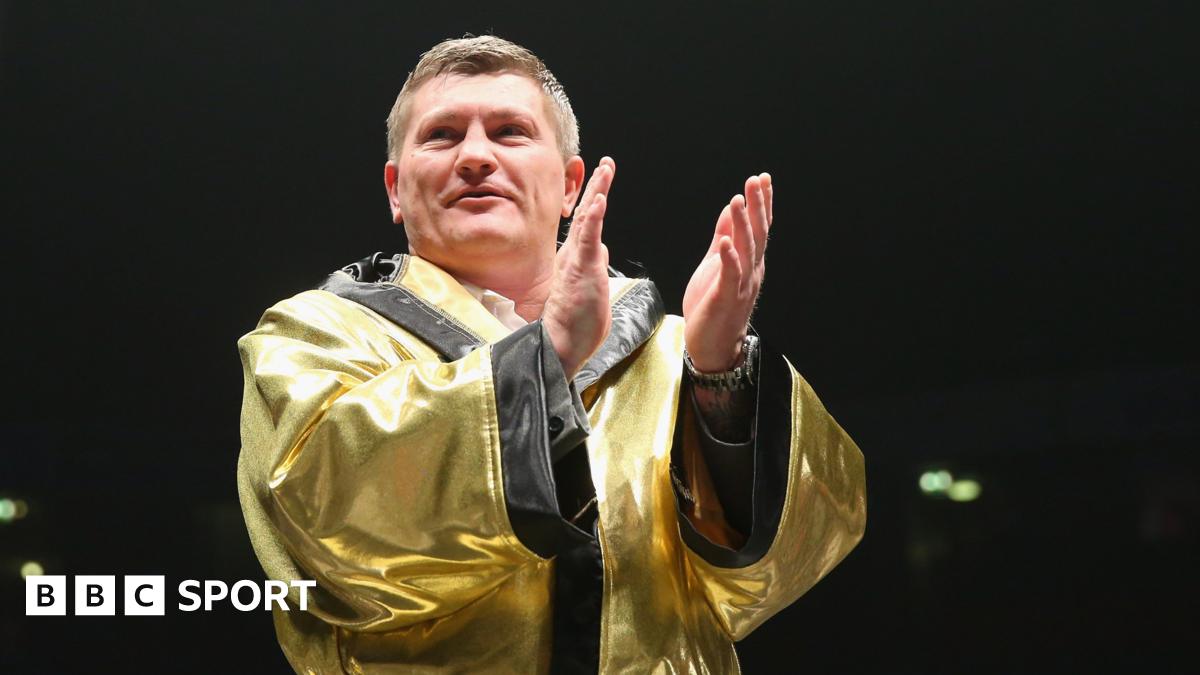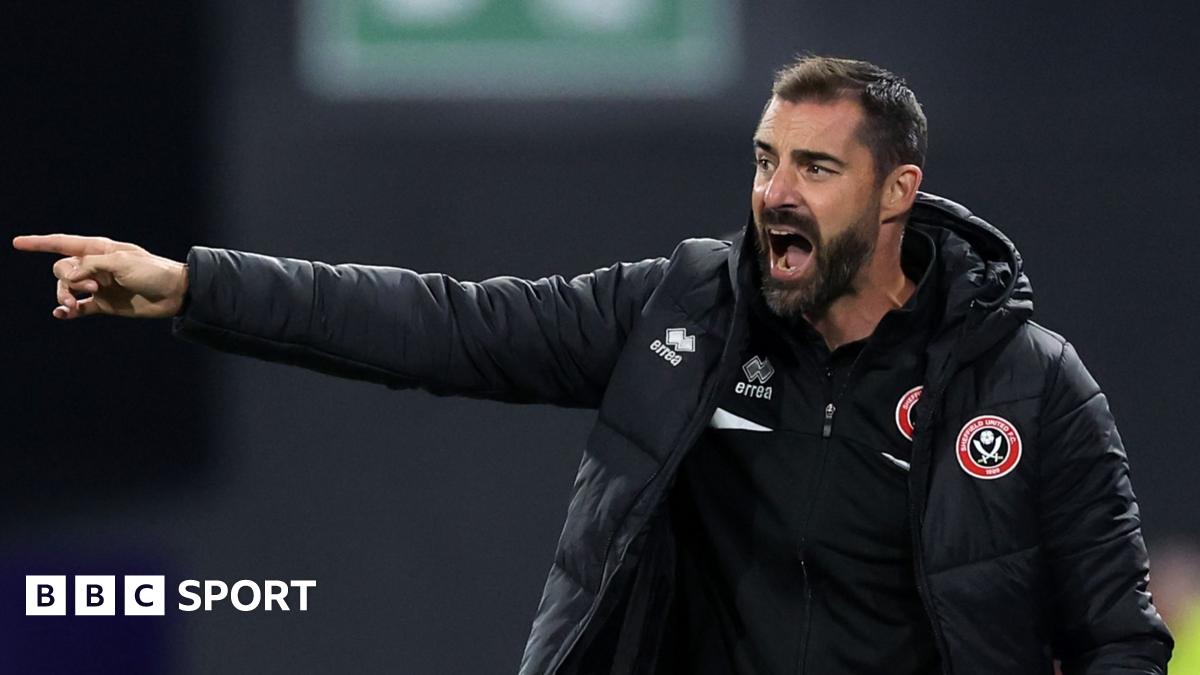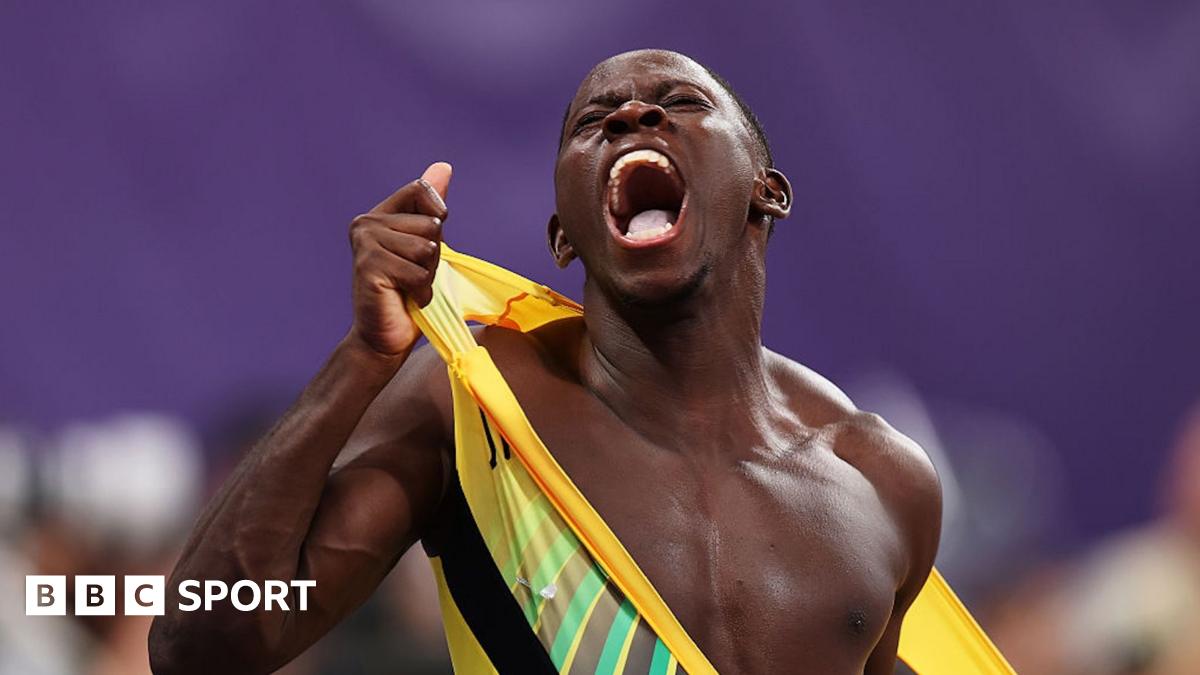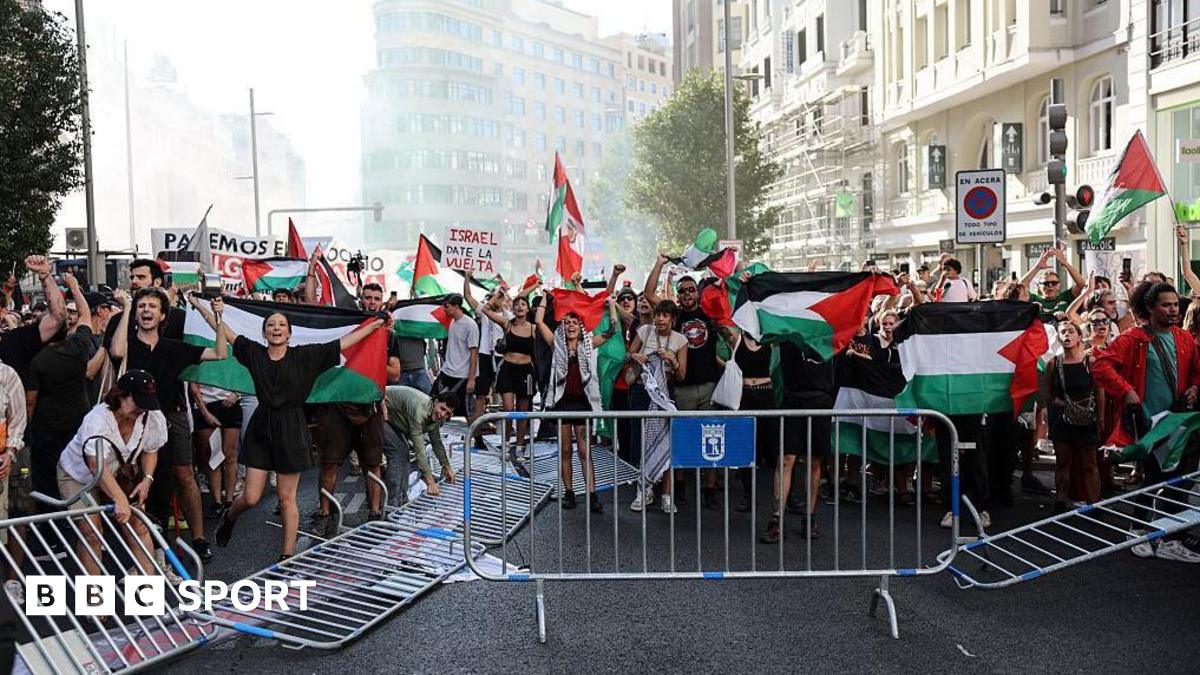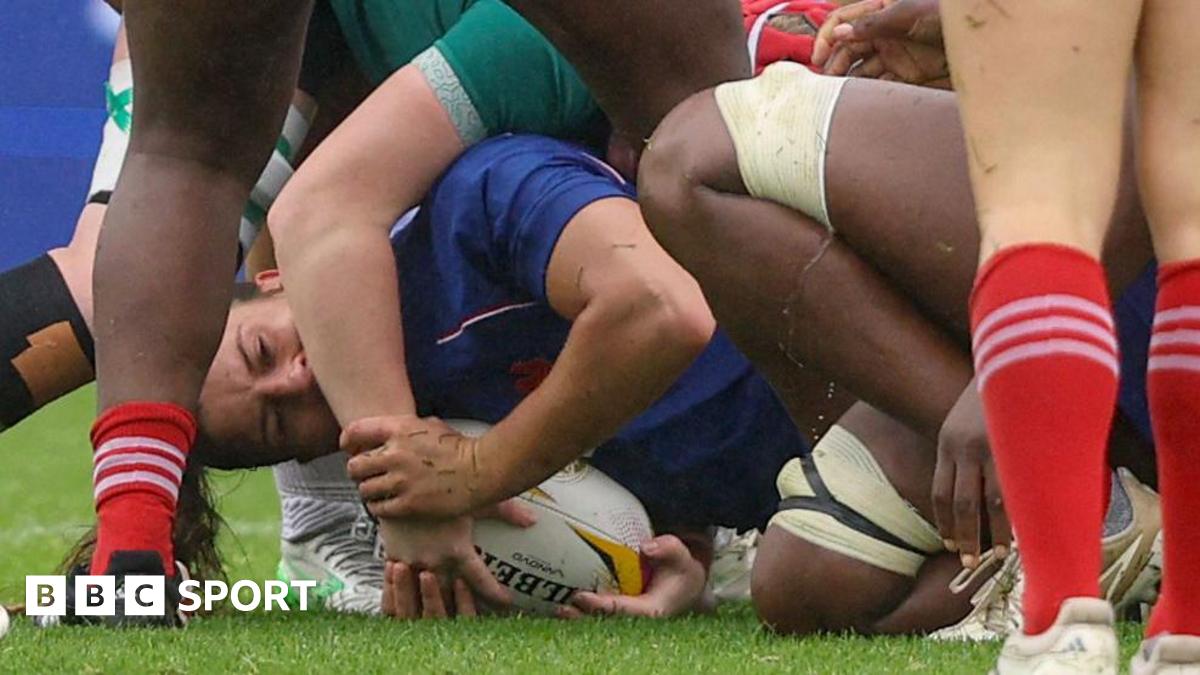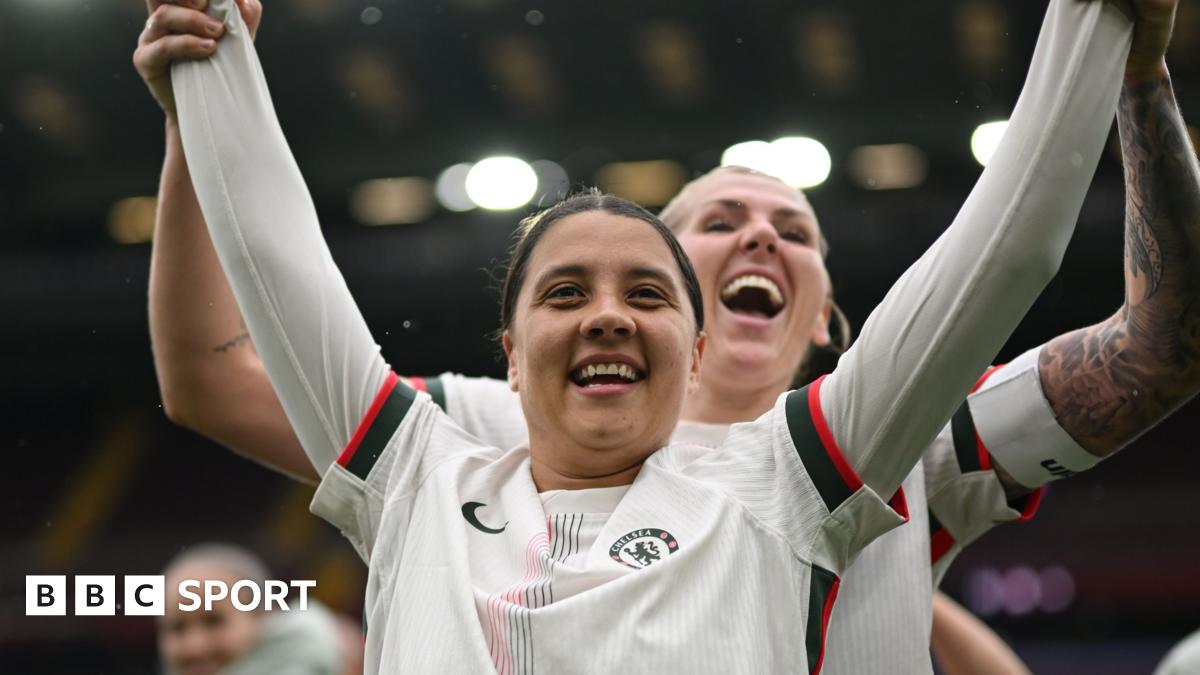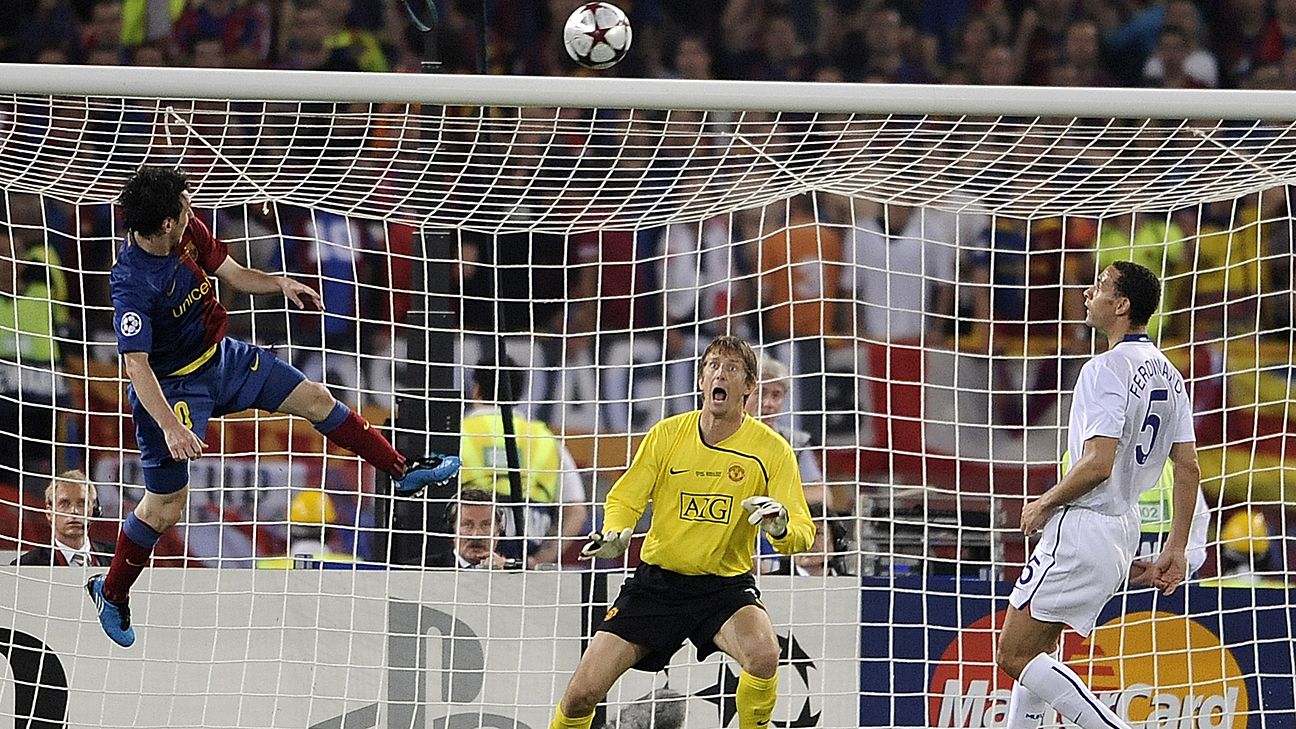
Not so many years ago, any young football lover in the football-mad city that is Barcelona - male or female - when asked to name their heroes or role models would almost certainly come out with names like Messi, Xavi or Iniesta.
These days they are just as likely to name someone like the former winner of the women's Ballon d'Or, Alexia Putellas or twice winner and current holder of the award, Aitana Bonmati, who is generally regarded as the best female player in the world.
On Saturday, just 10 years after they became professional and only 23 years since they officially became part of the Catalan institution, FC Barcelona Femeni will face Arsenal in Lisbon in search of their third Women's Champions League trophy in a row - and their fourth in five years.
Along the way they have scored 44 goals in just 10 games this season including a 10-2 aggregate quarter-final demolition of Wolfsburg, and an 8-2 humbling of Chelsea across the two-legged semi-final.
Arsenal might look to take encouragement from the fact Barcelona were beaten 2-0 in the group stages by Manchester City, although a 3-0 victory for the Spanish side in their second meeting with the Women's Super League team ensured they finished top of their group.
But Barcelona's rise to becoming the major powerhouse is, as is so often the case with women's football, a story of battling against the odds in the face of a barrage of prejudice, misogyny and rejection.
Sheds for changing rooms
Football was regarded very much as a male preserve when a Barcelona women's side was first formed around the 1970s, just as Spain was limping out of dictatorship into what was then a fragile democracy.
But, in a world where women's football was perceived - by men, of course - as something a bit weird, not quite the thing, they were initially blocked from joining FC Barcelona, before finally becoming part of the club in 2002.
However, until 2015 they were forbidden from using any of the men's facilities other than during international breaks, when they were given special dispensation to do so, unless any one person from the men's first team wanted to use them, in which case they would have to vacate immediately.
Marta Unzue joined the club in 2006 and made about 280 appearances for them over a 14-year spell, including three years as club captain between 2014-17.
When I interviewed her for my book on the history of Barcelona's captains, she told me: "I don't know what a lot of people earned, but I was paid €200 [£168] a month when I arrived at Barca.
"It's true that the club provided me with an apartment. The club also helped me with my studies, but I spent almost all my money on the metro ticket, which bought me a three-month pass."
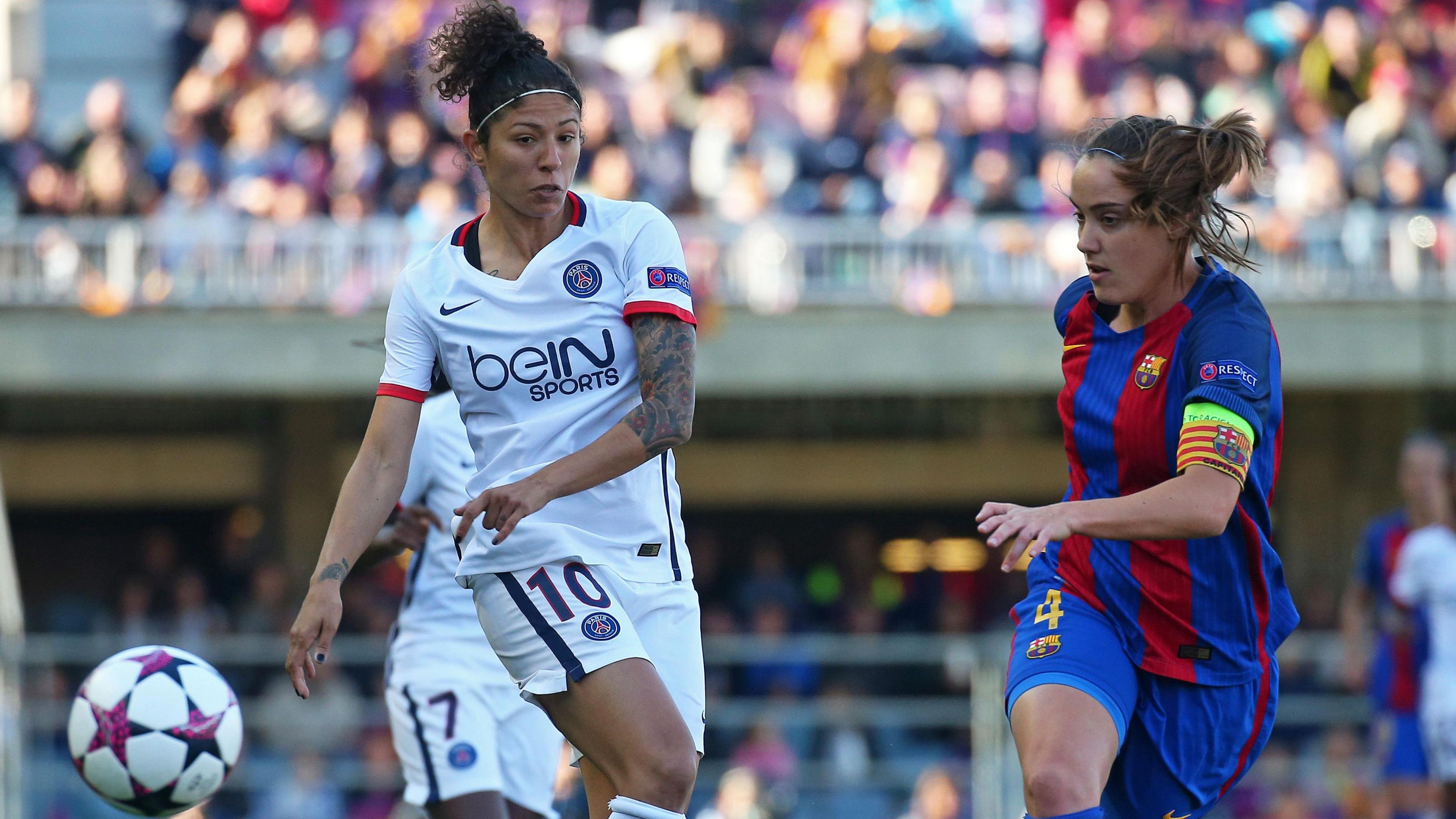 Image source, Getty Images
Image source, Getty Images
Marta Unzue (right) won four league titles during her time at Barcelona
But it was about so much more than just money. Playing conditions were primitive. Surfaces were dirt pitches that doubled as car parks on matchdays and changing rooms were sheds crammed with up to 30 people and fitted with inadequate showers that would always quickly run out of hot water.
"We didn't ask for the same financial earnings, because you also have to be aware of what men's and women's football generate, but we did deserve to play on a decent pitch and to have a decent locker room," she said.
To add insult to injury they also had to pay their own travel expenses to get not only to and from the ground for training, but also on matchdays. When they asked if they could be reimbursed for their travel costs, they were told the money was not available. All the men's teams, however, either had a bus organised for them or would be picked up by the club.
And up until 2017, women were still wearing men's kit for both playing and training.
"When I arrived, we did our laundry at home. They gave us two or three sets, I don't remember exactly how many, and we washed them at home," Unzue said.
"They would give us the smallest sizes but even that was too big for us."
Getting to away games was another ordeal, Unzue explained: "We travelled almost always by bus, except for the longer trips, like Barcelona-Seville, where we flew.
"But from Barcelona to the Basque Country, by bus; to Madrid, by bus; to Valencia, by bus... it was a long bus ride, you arrived super tired, you had to play the game at 12 noon, return late, and on top of that, people were still working.
"There were a lot of people who arrived late at night and had to go to work the next day."
The club's much vaunted academy, La Masia, was also out-of-bounds for the women until very recently - women have only been admitted into the La Masia residency since 2021.
Things have improved considerably but there is still a massive divide. Bonmati is not just the greatest woman player on the planet, she is also, deservedly, the highest paid. Her earnings last year were €1m (£840,000). Her team-mate Putellas was the second-highest earner on €700,000 (£590,000). Barca's star striker for the men's side, Robert Lewandowski, is paid €30m (£25.3m).
Men's team DNA copied and pasted
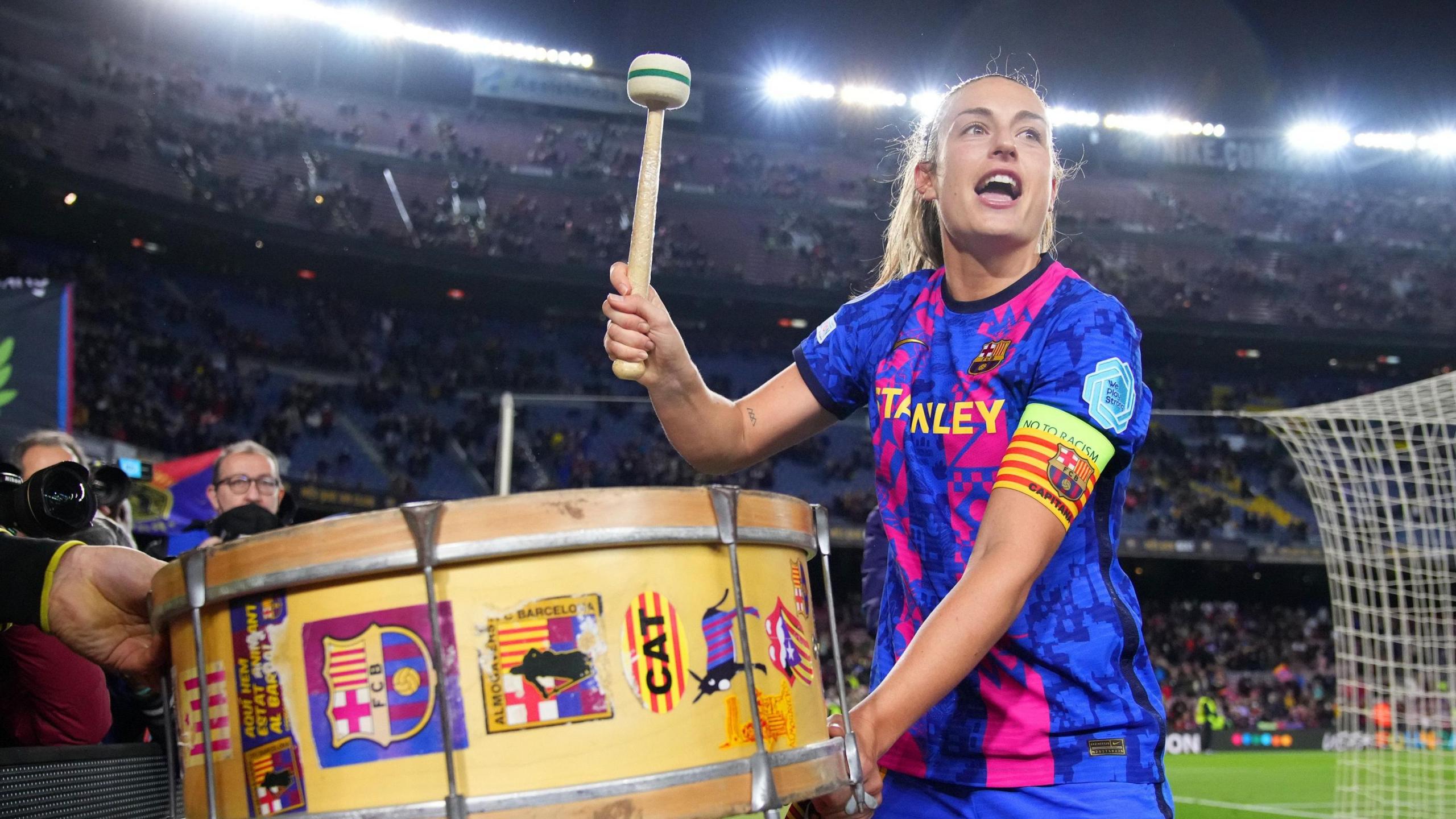 Image source, Getty Images
Image source, Getty Images
Alexia Putellas captained Barcelona as they broke the world record attendance for a women's match in their first appearance at the iconic Nou Camp
So how did Barcelona's women's team become the queens of Europe?
On 30 March 2022 at the Camp Nou, 91,553 turned out to see Barcelona trounce Real Madrid in the second leg of the Women's Champions League semi-final - 5-2 on the night and 8-3 on aggregate.
It beat the previous record for a women's match set in 1999 when 90,185 fans witnessed the World Cup final between the United States and China at the Pasadena Rose Bowl in California.
But they say that in football you learn much more from a heavy defeat than you do from a victory.
Back in 2019 they were outfought, outthought and outclassed by Lyon in their maiden Champions League final - a match that was effectively over after just 30 minutes, by which time the French side had scored four.
With Markel Zubizarreta in place as sporting director, the club set about creating a style copied and pasted from the DNA of the men's side - based on pressure, passing and possession.
It was the next step after professionalism had been embraced in 2015.
That had not, however, brought instant success and Barcelona were beaten by Atletico Madrid to the league title in 2017, 2018 and 2019.
But they were building for the future and showing players and fans alike that they were serious in their intentions.
A €3.5m (£2.95m) shirt sponsorship deal with hardware company Stanley finally guaranteed players the salaries they needed to focus full-time on football, helping to ensure financial stability and making the women's section financially independent from the men's side.
A women's academy at La Masia was established, creating a level playing field with the boys at the club. Investment in physiotherapists and nutritionists to ensure that all players would be as fit and healthy as they could possibly be also reaped dividends.
Finally, time, effort, seriousness - and above all, respect - were being invested in women's football, creating a model of what women's sport could look like at its best.
A move from grounds outside the Camp Nou to the Estadi Johan Cruyff, which is located at Barca's training facility and has a capacity of 6,000, helped to increase attendances.
With everything in place, success was only a matter of time.
'Mes que un club'
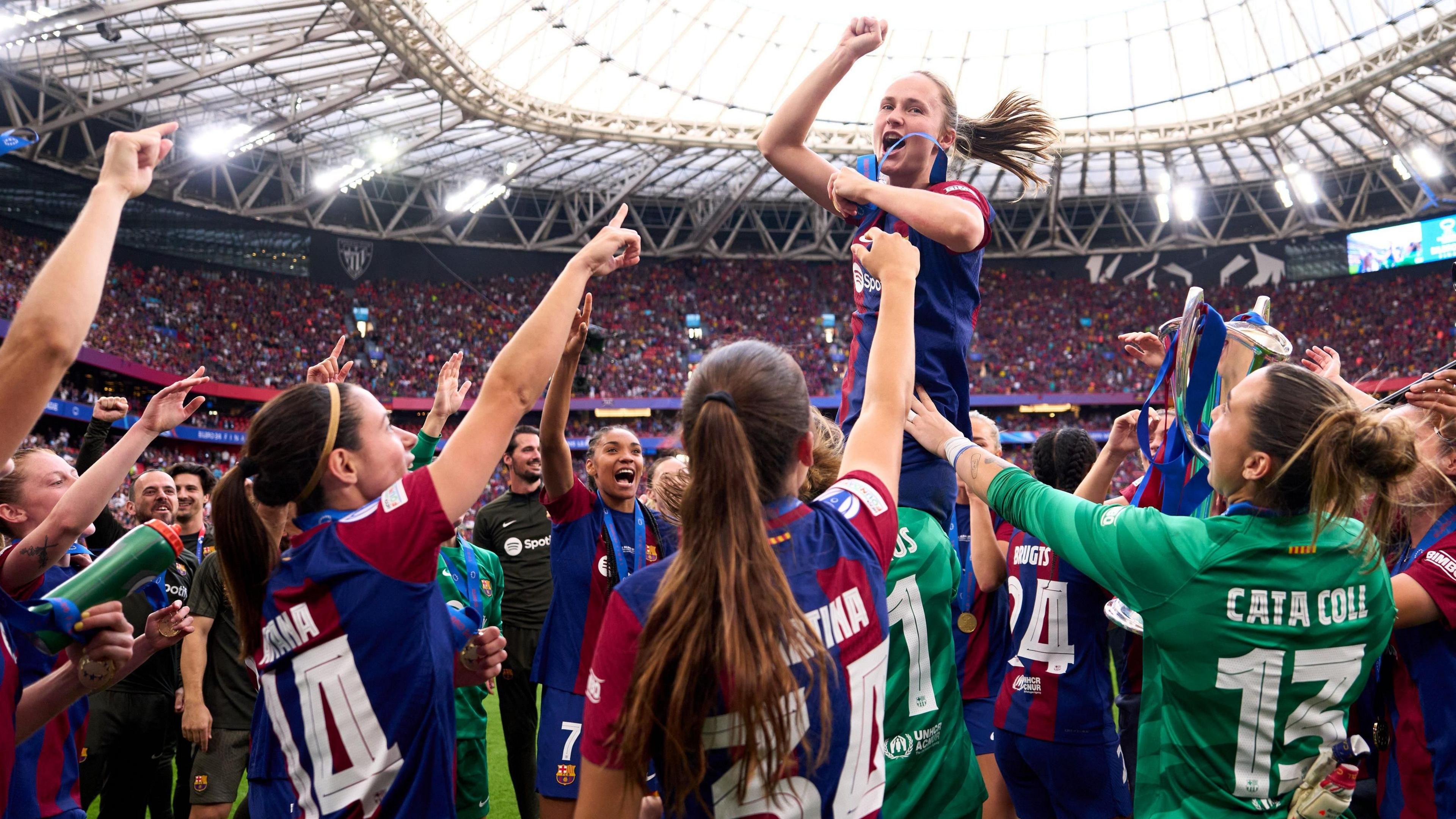 Image source, Getty Images
Image source, Getty Images
Barcelona have won the past two Champions League finals
Looking to sign homegrown talent and only bring in those external players that were disciples of the club's sacred style - or could at least adapt to it - they won the first of their three Champions Leagues in 2021 in Gothenburg, where they beat Chelsea 4-0.
Victory was especially sweet coming as it did at a time when the men's first team were going through a terrible run, having lost out to Paris St-Germain in the last 16 of the men's Champions League after a 4-1 home defeat sealed their fate.
In the league, meanwhile, the men's first team could only play third fiddle behind Atletico and Real Madrid. That season Barcelona's footballing pride was restored by its women's side, a team that flourished in a period when the men's team looked to have lost their way.
Barcelona have won every Spanish league title since 2019-20 and their players made up seven of Spain's starting XI for their 2023 World Cup final win against England. In addition, Bonmati picked up the Golden Ball as the best player of the tournament and her team-mate Salma Paralluelo picked up the tournament's Best Young Player Award.
For many Catalans, Barca has always been "mes que un club" - more than a club. Never has that felt truer than now, with the women's team leading the way in the world. They represent not just pride, but progress.
Arsenal await in Lisbon this weekend. Then Atletico Madrid in the Copa de la Reina final. Two more wins would seal a second straight Treble - a feat that would place them among the greatest club sides in football history.
Alongside the revival of the men's first team, the women have also become the heartbeat of FC Barcelona - not just winning, but showing the world what winning should look like.

 3 months ago
35
3 months ago
35


